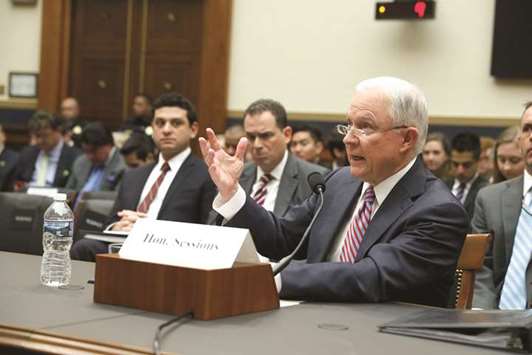Attorney General Jeff Sessions said yesterday that the Justice Department would work quickly to decide whether to appoint a special prosecutor to investigate Hillary Clinton, President Donald Trump’s election rival.
Sessions’ comments indicated that Republicans were seeking to mount a counter-offensive to the probe into Russian election meddling — and whether or not Trump’s campaign colluded with Moscow to sway the 2016 contest.
The Justice Department sent political shockwaves across Washington late on Monday when it revealed it was evaluating the possibility of naming a special counsel to probe the foundation of former president Bill Clinton and its ties to firms involved in a deal that sold US uranium rights to a Russian state company.
The letter also said it was reviewing the FBI’s handling last year of a probe into Hillary Clinton’s use of a personal server for official and in some cases classified e-mails, in breach of government rules, while she was secretary of state.
In the year since his election win, Trump has repeatedly suggested that the Justice Department should investigate allegations against the Clintons.
Sessions promised the committee that his department would move quickly to decide whether to take action on the cases, including appointing a special prosecutor.
“Do I have your assurance that these matters will proceed fairly and expeditiously?” committee chairman Robert Goodlatte asked him.
“Yes, you can, Mr Chairman, and you can be sure that they will be done without political influence and they will be done correctly and properly.”
Democrats said any such action would represent an unacceptable politicisation of the country’s justice system.
“If the AG bends to pressure from President Trump and his allies, and appoints a special counsel to investigate Trump’s vanquished rival, it could spell the end of the DOJ as an independent institution,” Democratic Representative Adam Schiff said on Twitter.
In an appearance before the House Judiciary Committee that at times became contentious, Sessions walked back earlier testimony made under oath that he had no knowledge of contacts between Trump’s campaign and Russia.
Recent court documents and testimony revealed fresh information on relations last year between Russian officials and Trump’s foreign policy advisory team, which was led by Sessions.
He denied lying in past Capitol Hill hearings, but told lawmakers he had forgotten about a meeting in March 2016 with Trump, then a presidential candidate, and his foreign policy advisers at which such contacts were discussed.
“I do now recall the March 2016 meeting at Trump Hotel that Mr (George) Papadopoulos attended, but I have no clear recollection of the details of what he said during that meeting,” Sessions testified.
“After reading his account, and to the best of my recollection, I believe that I wanted to make clear to him that he was not authorised to represent the campaign with the Russian government, or any other foreign government, for that matter.”
Papadopoulos has pleaded guilty to a charge of lying to the FBI in the matter, in a deal that made clear he is assisting independent special prosecutor Robert Mueller, who is leading the Russian election meddling probe.
Sessions adamantly insisted that he was not changing his previous testimony.
“My answers have never changed. I have always told the truth,” he said.
“I will not accept and reject accusations that I have ever lied under oath. That is a lie.”
Separately, Sessions slammed leaks of classified information that he said had reached “epidemic proportions,” and confirmed the existence of 27 probes into such leaks.
“It cannot be allowed to continue and we will do our best effort to ensure it does not continue,” the attorney general said.
Trump has complained often and bitterly about leaks of sensitive information since he came to power, notably related to the probe being led by Mueller.

US Attorney General Jeff Sessions testifies before a House Judiciary Committee hearing on oversight of the Justice Department on Capitol Hill in Washington yesterday.
